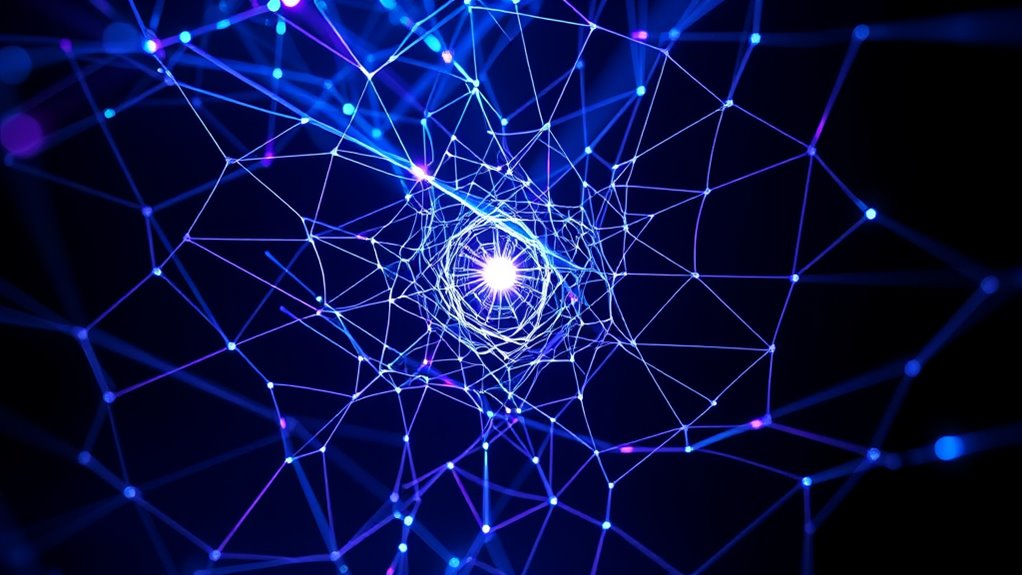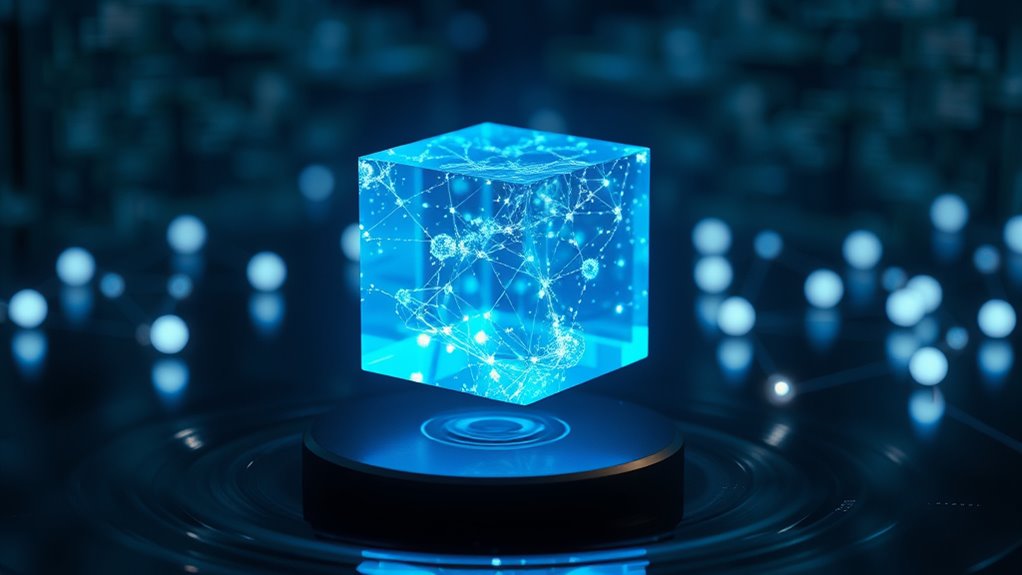Imagine a spinning coin that can be both heads and tails at the same time until it lands. This is like a quantum computer’s qubits, which can exist in multiple states simultaneously thanks to superposition. They can test many possibilities at once, making complex calculations much faster than traditional computers. Entanglement links particles instantaneously, adding even more power. To discover how these phenomena work together and release incredible potential, keep exploring deeper into quantum basics.
Key Takeaways
- Quantum bits, or qubits, can be in multiple states at once, like a spinning coin that is both heads and tails simultaneously.
- Entanglement links particles so that measuring one instantly reveals the state of the other, regardless of distance.
- Quantum computers process many possibilities simultaneously, similar to exploring all paths in a maze at once.
- Superposition allows quantum systems to test multiple solutions simultaneously, speeding up complex problem-solving.
- Think of quantum computing as a magical library that can instantly access all books (solutions) without searching one by one.

Have you ever wondered how future computers might solve complex problems faster than anything we have today? The answer lies in a fascinating world called quantum computing, where the rules of classical physics no longer apply. Instead, phenomena like entanglement mysteries and superposition principles come into play, allowing quantum computers to process information in ways that seem almost magical. To grasp this, picture a coin spinning rapidly on a table. While it’s spinning, it’s neither heads nor tails but a blur of both at once. That’s a simple way to understand superposition principles, which let quantum bits, or qubits, exist in multiple states simultaneously. Unlike traditional bits, which are either 0 or 1, qubits can be in a blend of both states until measured, giving quantum computers a massive advantage in parallel processing.
Now, imagine you have two such spinning coins that are somehow connected in a mysterious way. When you observe one, the state of the other instantly changes, no matter how far apart they are. This is the essence of entanglement mysteries—an odd feature of quantum physics where particles become linked in ways that defy classical understanding. In quantum computing, entangled qubits work together in a coordinated dance, enhancing the computer’s ability to analyze complex problems. This interconnectedness means that quantum computers can handle enormous data sets and perform calculations that would take traditional computers thousands of years to complete.
Think of entanglement like a pair of magical gloves: if you find the left glove, you instantly know what the right glove looks like, even if it’s on the other side of the world. This connection allows quantum algorithms to explore multiple solutions simultaneously, drastically reducing the time needed to find answers. The superposition principles enable each qubit to be in multiple states at once, creating a vast combination of possibilities that can be tested all at once. When combined with entanglement, this power becomes exponentially greater, allowing quantum computers to tackle problems like cryptography, drug discovery, and optimization with unprecedented speed. Additionally, understanding the power consumption of quantum systems is essential for their development and practical application.
In essence, quantum computing is like having a supercharged problem-solving team that thinks in multiple directions at once, thanks to superposition principles and entanglement mysteries. These quantum phenomena break the limits of traditional computing, opening a new frontier where the impossible becomes possible. As scientists continue to unravel these mysteries, the potential for quantum computers to revolutionize our world grows ever closer. With each breakthrough, you’ll see more of these bizarre, beautiful quantum effects transforming how we solve the toughest challenges.
Frequently Asked Questions
How Does Quantum Computing Compare to Classical Computing Speed?
You’ll find that quantum computing can be much faster than classical computing because it leverages superposition states and entanglement effects. Unlike classical bits that are either 0 or 1, qubits can exist in multiple states simultaneously, allowing for parallel processing. Entanglement further connects qubits, speeding up complex calculations. This means quantum computers can solve certain problems exponentially faster, revolutionizing fields like cryptography and optimization.
What Are Qubits, and How Do They Differ From Regular Bits?
Imagine you’re in the 21st century, marveling at qubits, which are unlike regular bits. You see, qubits can exist in superposition states, meaning they’re both 0 and 1 at once, thanks to quantum mechanics. They also engage in entanglement phenomena, connecting instantly across distances. Unlike bits, which are strictly 0 or 1, qubits harness these unique properties, making quantum computers vastly more powerful for complex calculations.
Can Quantum Computers Replace All Current Computers?
You might wonder if quantum computers will replace all current computers. While they excel at complex tasks using phenomena like quantum entanglement, they face challenges like quantum decoherence, which affects stability. Quantum computers are better suited for specific problems, but traditional computers remain more practical for everyday use. So, rather than replacing, they’ll complement existing tech, handling specialized tasks where quantum advantages outweigh their limitations.
What Are the Main Challenges in Building Quantum Computers?
You face major challenges in building quantum computers, especially with entanglement complexity, which makes managing qubits difficult. Error correction is another hurdle, as qubits are prone to errors from environmental interference, threatening stability. To overcome this, you need advanced techniques to maintain coherence and control entanglement. Developing scalable, reliable quantum systems hinges on solving these issues, making progress in these areas essential for future breakthroughs.
How Safe Are Quantum Computers in Terms of Data Security?
You’re probably wondering about quantum computers’ data security. They can potentially break traditional encryption, making data vulnerable. However, quantum encryption, like quantum key distribution, offers a new way to secure information, making it much safer. While quantum computers pose a threat to existing security methods, ongoing advancements in quantum encryption aim to protect data from vulnerabilities, ensuring your information remains secure even as technology evolves.
Conclusion
Now that you see how quantum computing works, it’s clear it’s revolutionizing technology. Did you know that quantum computers could someday solve complex problems in seconds that would take traditional computers thousands of years? This incredible speed could transform fields like medicine, finance, and security. As you continue exploring, remember that this cutting-edge technology is just beginning to unseal its full potential. Stay curious—quantum’s future is truly exciting!










